Featured Articles
Adrien Broner Opens Up

 Such t-shirts, and a refusal to bow down and apologize for stuff like the Escobedo scale fail mean Broner will have plenty of haters. But the writer saw another side of the brash boxer at HBO headquarters, and had his eyes opened. (Hogan)
Such t-shirts, and a refusal to bow down and apologize for stuff like the Escobedo scale fail mean Broner will have plenty of haters. But the writer saw another side of the brash boxer at HBO headquarters, and had his eyes opened. (Hogan)
I do not know if I saw the future of boxing at HBO headquarters on Wednesday. All due respect to then music critic Jon Landau, who knew what Bruce Springsteen was and would be when he saw the Jerseyite do his thing at a Harvard Square concert on May 9, 1974, but I cannot be sure that Adrien Broner will be seen as “the best boxer who ever put on a pair of gloves” when the 23 year-old Cincinnati boxer-entertainer hangs up his mitts.
But I did exit the building Wednesday after hearing Broner answer press queries for almost an hour with a a new outlook on the 24-0 hitter, who at times had struck me as someone whose talent for self-hype outstripped his skill set.
No, Broner didn't back off the boasty side of himself. He didn't seek to stroke the egos of the fightwriters in the room, cunningly telling them that he thanked them for attending, and for helping keep him “relevant.” Indeed, he gently lobbed a shot at us, dismissing us in so many words as “bu–holes,” at one point.
Yet, after the session, because he explained in more depth where he came from, and some of what he has gone through to form his personality, I found myself veering closer to the territory of being a straight-up fan. Yes, as I heard Frank Deford admit on an NPR essay a couple days ago, it is true. Writers do have their favorites, and just because they manage to put a lid on the rooting interest in press row when one of their faves gets it done, that doesn't mean that they can maintain a robotic streak of objectivity. And, of course, writers can grow to dislike an athlete, be it for their fighting style, or more often, for personality or behavior traits which don't mesh with their own preferences or world view. Me, I've told you over the years, I prefer the “do, not say I will do” types, I lean towards the strong silent types Tony Soprano labeled a “Gary Cooper” type character when bemoaning the dearth of them in today's society. But in the last couple years, I've spent a fair amount of time puzzling with myself why a Floyd Mayweather talks and acts like he does. And I figured out not that long ago that it bordered on the semi-useless for me to devote too much time to solving that puzzle. Because without walking a mile in the shoes he walked in growing up, experiencing some of the traumas and dramas he did growing up, in the places he grew up in, so unlike the Wellesley, Mass. fancy-schmancy household I grew up in, I would never be able to wrap my brain around all sides of Floyd.
And on the subject of perhaps the second-most polarizing man in the game, Broner…When I hear him say that in one, two, three fights, he could well be the man in the game, I could hear that, and tsk-tsk him in my head, or on this page, for boasting, for being excessively cocky, for driving off the road of confidence, into a ditch of ludicrous hubris.
If I wanted to to, I could, when I hear Broner say, “Critics are like buttholes, I don't listen to 'em. If I want to hear a butthole, I pass gas,” I could get into a thin-skinned tizzy, and mutter to you about a manner that screams “punk.”
But instead, after hearing the 23 year-old let down the guard, and tell us a bit more about where he came from, and what hurdles he's gotten over, hurdles such as needing to fill his belly with syrup and bread sandwiches, and tap water, to quell a grumbling stomach, I'm inclined to see Broner and hear his trash-talking differently.
I'm quite sure many of you will not change your take on the kid, will still cringe when he says that it isn't a matter of whether he will fight the Brandon Rios', and Canelos, and Robert Guerreros, but whether they have the stones to accept a fight with him.
I'm sure I won't budge some of you when Broner says himself at 23 is superior to Floyd Mayweather at age 23, or when you hear the guy who had a hard time with Ponce De Leon say he doesn't think Nov. 17 foe Antonio Demarco will be able to do much against him.
Some of you might look at Mayweather put him and Broner side by side in your head and pick Floyd as the humbler of the two. When asked if his progress keeps up, in a year or two years he could see himself at 147 pounds or more, fighting Floyd Mayweather, Broner replied in the affirmative: “Of course, if he's around, I don't see him staying around too much longer. I don't know why he'd do that, that'd be dumb. Everyone know that age catches up to everyone, there's always the young lion with the same talent as you…that's too dangerous, I don't think he'd do it.”
Wait, did he just really say that he didn't think Mayweather would be wise to fight him in a year or two, that that was a “dangerous” and foolish endeavor? He did, and it is those sort of statements which make Broner more of a must-see fighter…because he is building an immense wall of expectations for himself to try to climb over, and there will be no shortage of people who watch him like they do Nascar races: hoping for him to crash and burn.
I asked Broner if after Demarco he'd fight Mayweather, leap from 135 to 147 pounds. “I love him and all but anyone who's on the other side of ring from me, I got five kids …I love Floyd to death but I don't care who is on the other side of the ring..when I get in there I have tunnel vision.”
So, Broner versus Mayweather, in a ring, tomorrow, would you beat Floyd? Broner paused…”Honestly, I'm going to be honest with you and myself I have a lot to work on, but at 23 I would have kicked his ass. I do what he do now, in his prime.”
You give him points for chutzpah…or do his words make you see him as a villain, as public boxing enemy number one, who you'd pay to see get some humble pounded into him? That likely depends on where you came from. Broner came from Cincinnati, which doesn't ring a bell with me, but the way he said it on Wednesday, means he came from a place that most of your movers and shakers pass by on their way to less complicated, more opulent locations.
“I come from Cincinnati,” he told the press Wednesday, describing how he intended to fight for the US in the 2008 Olympics, but instead got taken off that path because he “got into some trouble.”
What he did, he wouldn't specify, but here's how Broner put it: “Some big trouble too. They tried to give me football numbers but for the grace of God I came out on top.” I didn't get the “football” reference, so I asked for a clarifier. “A receiver, like 85 years, stuff like that,” Broner explained.
Without us asking explicitly, he led us into a detailed explanation of how and why he got into the sport. “I'm smart, my mom she was on dean's list and all that, so after school I would have school at home, I would have to read books, do all this, all this really burned me out.” He said he was bored in school, because he already knew what was being taught, and as teen knew he wouldn't grow to adore school. He knew he could sell drugs, he said, but realized that was a dead end. Basketball would be a fine path, but he knew Spud Webb was an exception, not a rule, in the NBA. “Boxing,” Broner said, “I always found boxing, always came back to boxing, boxing, boxing. Boxing, this is it, this is gonna be the thing gonna take me over the top.” He was 18.
Before he got full-tilt into boxing, he had to do some time, more than a year, but Broner said that was made more palatable because family and some friends stood by him. He promised God and himself he'd go hard after the boxing goal if He saw it fit to help him through the rough stretch.
I know it made me better comprehend what could be seen as cocky talk when he admitted, “I know what it's like to wake up in the middle of the night and say 'I'm hungry,' and see what's to eat and say, 'F—, I got to eat syrup and bread again … and water. I know what that feels like.”
And I don't. And so I think it's wise for me to give extra respect to, and latitude to, people who have come from that, to where Broner is today. It is fashionable in many circles today to blast the Have Nots for not having enough character to rise above meager circumstances, to dismiss as loafers, as Takers, the jobless or those needing government assistance to stay afloat. One candidate for the Vice President post was just seen in an interview saying that, basically, the inner cities could be cleaned up if the citizens living there were taught “good discipline.” I don't subscribe to that one-size-fits-all-wretches view; I am not under the illusion that I am made of such solid stuff that if I were born into a sub-optimal economic situation, and wasn't Caucasian, I would rise above, and triumph over sub-humble beginnings.
I have to say, boxing is blessed, because we have this every man for himself system, with no commissioner strong-arming athletes into toeing the line, and sticking to politically correct speech. You saw that when Broner got into the issue of race. On Oct. 3, Ring TV ran a story, a Q 'n A, on Broner. He'd chatted with Lem Satterfield, who I know as a decent soul and a total professional. Broner touched on the matter of whether he'd get props if and when he beat Demarco. “Like I've told you before, man, they will never give me the credit when it's due,” he told Satterfield. “Even if I go in and I knock this guy out in the first round, they're going to always find something, you know? They're going to always find something. But what can they say? I was supposed to do it? I was faster and I've got more talent? What? I mean, he's the world champion at 135, and he just came off of some great stoppages, and so whatever I go in there and do, of course I want them to give me what I deserve. But just being me, and, you know, I'm an African American. So, you know, they're going to always find something wrong, and they're going to always find something to say. So that's why I just do what I do, and I don't even worry about the critics, man.”
Satterfield asked him to expound, asking, “What do you mean about your being an African American?”
“I really don't want to get into it because I don't want to make it a racial thing because I love the Hispanics, I love the Mexicans,” Broner said. “You know, I love all races of people. But at the end of the day, man, we all know that it's so hard for us. It's so hard. I don't really want to get into it, but you know what's going on.” So Satterfield let the subject drop, understandably. The subject was again brought up Wednesday.
Asked to clarify that Oct. 3 story, Broner said he meant that African-Americans don't support other African-American fighters, not the way Hispanic fans support other Hispanic fighters. “It's so hard for us to support our own, coming up from where we come from, they don't want to see the next man doing better than them, ” Broner said. So, black fans don't support black fighters like some other groups support boxers of the same race or ethnicity? “Exactly,” Broner said. “It's the truth.”
He said he though the Ring piece made him look like he was “racist or something” but I didn't get that from reading it, and knowing Satterfield, and how much he cares, I have to stick up for Lem, and his professionalism, and put it out there that any sort of tabloid-y exploitation is not his way, not ever. Also, you might recall Lamont Peterson touched on the same subject back in April 2011, with Satterfield. “Black people are not showing the support that's necessary to make household names in boxing,” Peterson said then.
I'm looking forward to keeping tabs on Broner's arc. He could be a stellar role model for many of those kids in Cincy, and other Have Not neighborhoods, to look up to, so I'm hoping he will embrace that power he will be able to dispense. I suspect you sort of had to be there to have that change of heart, that new depth of appreciation for Broner that washed over me. Hey, the kid himself noted that the cameras and the editors know what to capture and splice and present to stir the pot and draw viewers. His brashest statements and behavior will be collected and disseminated. “I'm not a villain,” Broner explained at HBO. “I'm just being me. I know it can rub off on some people some way, 'This guy is too cocky, too arrogant, this and that. But when they get to know about me they fall in love with me.”
Maybe not, but I think moving forward, if not love, more boxing fans will at least grow to better understand, and respect Adrien Broner.
Featured Articles
Thomas Hauser’s Literary Notes: Johnny Greaves Tells a Sad Tale
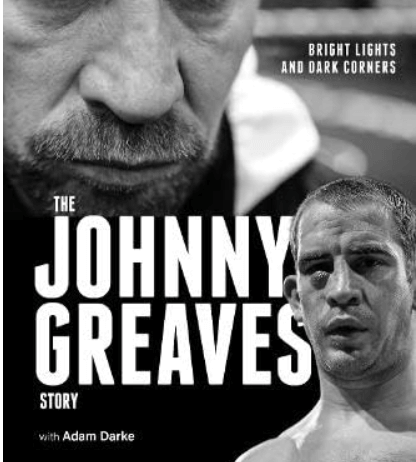
Johnny Greaves was a professional loser. He had one hundred professional fights between 2007 and 2013, lost 96 of them, scored one knockout, and was stopped short of the distance twelve times. There was no subtlety in how his role was explained to him: “Look, Johnny; professional boxing works two ways. You’re either a ticket-seller and make money for the promoter, in which case you get to win fights. If you don’t sell tickets but can look after yourself a bit, you become an opponent and you fight to lose.”
By losing, he could make upwards of one thousand pounds for a night‘s work.
Greaves grew up with an alcoholic father who beat his children and wife. Johnny learned how to survive the beatings, which is what his career as a fighter would become. He was a scared, angry, often violent child who was expelled from school and found solace in alcohol and drugs.
The fighters Greaves lost to in the pros ran the gamut from inept local favorites to future champions Liam Walsh, Anthony Crolla, Lee Selby, Gavin Rees, and Jack Catterall. Alcohol and drugs remained constants in his life. He fought after drinking, smoking weed, and snorting cocaine on the night before – and sometimes on the day of – a fight. On multiple occasions, he came close to committing suicide. His goal in boxing ultimately became to have one hundred professional fights.
On rare occasions, two professional losers – “journeymen,” they’re called in The UK – are matched against each other. That was how Greaves got three of the four wins on his ledger. On September 29, 2013, he fought the one hundredth and final fight of his career against Dan Carr in London’s famed York Hall. Carr had a 2-42-2 ring record and would finish his career with three wins in ninety outings. Greaves-Carr was a fight that Johnny could win. He emerged triumphant on a four-round decision.
The Johnny Greaves Story, told by Greaves with the help of Adam Darke (Pitch Publishing) tells the whole sordid tale. Some of Greaves’s thoughts follow:
* “We all knew why we were there, and it wasn’t to win. The home fighters were the guys who had sold all the tickets and were deemed to have some talent. We were the scum. We knew our role. Give some young prospect a bit of a workout, keep out of the way of any big shots, lose on points but take home a wedge of cash, and fight again next week.”
* “If you fought too hard and won, then you wouldn’t get booked for any more shows. If you swung for the trees and got cut or knocked out, then you couldn’t fight for another 28 days. So what were you supposed to do? The answer was to LOOK like you were trying to win but be clever in the process. Slip and move, feint, throw little shots that were rangefinders, hold on, waste time. There was an art to this game, and I was quickly learning what a cynical business it was.”
* “The unknown for the journeyman was always how good your opponent might be. He could be a future world champion. Or he might be some hyped-up nightclub bouncer with a big following who was making lots of money for the promoter.”
* “No matter how well I fought, I wasn’t going to be getting any decisions. These fights weren’t scored fairly. The referees and judges understood who the paymasters were and they played the game. What was the point of having a go and being the best version of you if nobody was going to recognize or reward it?”
* “When I first stepped into the professional arena, I believed I was tough. believed that nobody could stop me. But fight by fight, those ideas were being challenged and broken down. Once you know that you can be hurt, dropped and knocked out, you’re never quite the same fighter.”
* “I had started off with a dream, an idea of what boxing was and what it would do for me. It was going to be a place where I could prove my toughness. A place that I could escape to and be someone else for a while. For a while, boxing was that place. But it wore me down to the point that I stopped caring. I’d grown sick and tired of it all. I wished that I could feel pride at what I’d achieved. But most of the time, I just felt like a loser.”
* “The fights were getting much more difficult, the damage to my body and my psyche taking longer and longer to repair after each defeat. I was putting myself in more and more danger with each passing fight. I was getting hurt more often and stopped more regularly. Even with the 28-day [suspensions], I didn’t have time to heal. I was staggering from one fight to the next and picking up more injuries along the way.”
* “I was losing my toughness and resilience. When that’s all you’ve ever had, it’s a hard thing to accept. Drink and drugs had always been present in my life. But now they became a regular part of my pre-fight preparation. It helped to shut out the fear and quieted the thoughts and worries that I shouldn’t be doing this anymore.”
* “My body was broken. My hands were constantly sore with blisters and cuts. I had early arthritis in my hip and my teeth were a mess. I looked an absolute state and inside I felt worse. But I couldn’t stop fighting yet. Not before the 100.”
* “I had abused myself time after time and stood in front of better men, taking a beating when I could have been sensible and covered up. At the start, I was rarely dropped or stopped. Now it was becoming a regular part of the game. Most of the guys I was facing were a lot better than me. This was mainly about survival.”
* “Was my brain f***ed from taking too many punches? I knew it was, to be honest. I could feel my speech changing and memory going. I was mentally unwell and shouldn’t have been fighting but the promoters didn’t care. Johnny Greaves was still a good booking. Maybe an even better one now that he might get knocked out.”
* “Nobody gave a f*** about me and whether I lived or died. I didn’t care about that much either. But the thought of being humiliated, knocked out in front of all those people; that was worse than the thought of dying. The idea of being exposed for what I was – a nobody.”
* “I was a miserable bastard in real life. A depressive downbeat mouthy little f***er. Everything I’ve done has been to mask the feeling that I’m worthless. That I have no value. The drinks and the drugs just helped me to forget that for a while. I still frighten myself a lot. My thoughts scare me. Do I really want to be here for the next thirty or forty years? I don’t know. If suicide wasn’t so impactful on people around you, I would have taken that leap. I don’t enjoy life and never have.”
So . . . Any questions?
****
Steve Albert was Showtime’s blow-by-blow commentator for two decades. But his reach extended far beyond boxing.
Albert’s sojourn through professional sports began in high school when he was a ball boy for the New York Knicks. Over the years, he was behind the microphone for more than a dozen teams in eleven leagues including four NBA franchises.
Putting the length of that trajectory in perspective . . . As a ballboy, Steve handed bottles of water and towels to a Knicks back-up forward named Phil Jackson. Later, they worked together as commentators for the New Jersey Nets. Then Steve provided the soundtrack for some of Jackson’s triumphs when he won eleven NBA championships as head coach of the Chicago Bulls and Los Angeles Lakers.
It’s also a matter of record that Steve’s oldest brother, Marv, was arguably the greatest play-by-play announcer in NBA history. And brother Al enjoyed a successful career behind the microphone after playing professional hockey.
Now Steve has written a memoir titled A Funny Thing Happened on the Way to the Broadcast Booth. Those who know him know that Steve doesn’t like to say bad things about people. And he doesn’t here. Nor does he delve into the inner workings of sports media or the sports dream machine. The book is largely a collection of lighthearted personal recollections, although there are times when the gravity of boxing forces reflection.
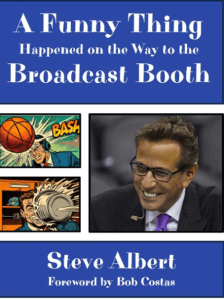
“Fighters were unlike any other professional athletes I had ever encountered,” Albert writes. “Many were products of incomprehensible backgrounds, fiercely tough neighborhoods, ghettos and, in some cases, jungles. Some got into the sport because they were bullied as children. For others, boxing was a means of survival. In many cases, it was an escape from a way of life that most people couldn’t even fathom.”
At one point, Steve recounts a ringside ritual that he followed when he was behind the microphone for Showtime Boxing: “I would precisely line up my trio of beverages – coffee, water, soda – on the far edge of the table closest to the ring apron. Perhaps the best advice I ever received from Ferdie [broadcast partner Ferdie Pacheco] was early on in my blow-by-blow career – ‘Always cover your coffee at ringside with an index card unless you like your coffee with cream, sugar, and blood.’”
Writing about the prelude to the infamous Holyfield-Tyson “bite fight,” Albert recalls, “I remember thinking that Tyson was going to do something unusual that night. I had this sinking feeling in my gut that he was going to pull something exceedingly out of the ordinary. His grousing about Holyfield’s head butts in the first fight added to my concern. [But] nobody could have foreseen what actually happened. Had I opened that broadcast with, ‘Folks, tonight I predict that Mike Tyson will bite off a chunk of Evander Holyfield’s ear,’ some fellas in white coats might have approached me and said, ‘Uh, Steve, could you come with us.'”
And then there’s my favorite line in the book: “I once asked a fighter if he was happily married,” Albert recounts. “He said, ‘Yes, but my wife’s not.'”
“All I ever wanted was to be a sportscaster,” Albert says in closing. “I didn’t always get it right, but I tried to do my job with honesty and integrity. For forty-five years, calling games was my life. I think it all worked out.”
Thomas Hauser’s email address is thomashauserwriter@gmail.com. His next book – The Most Honest Sport: Two More Years Inside Boxing – will be published this month and is available for preorder at:
https://www.amazon.com/Most-Honest-Sport-Inside-Boxing/dp/1955836329
In 2019, Hauser was selected for boxing’s highest honor – induction into the International Boxing Hall of Fame.
To comment on this story in the Fight Forum CLICK HERE
Featured Articles
Argentina’s Fernando Martinez Wins His Rematch with Kazuto Ioka
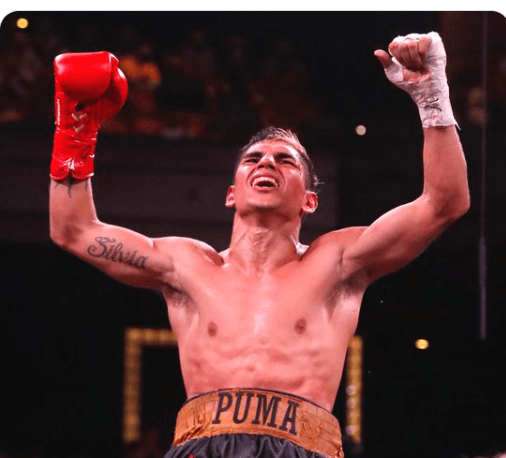
In an excellent fight climaxed by a furious 12th round, Argentina’s Fernando Daniel Martinez came off the deck to win his rematch with Kazuto Ioka and retain his piece of the world 115-pound title. The match was staged at Ioka’s familiar stomping grounds, the Ota-City General Gymnasium in Tokyo.
In their first meeting on July 7 of last year in Tokyo, Martinez was returned the winner on scores of 117-111, 116-112, and a bizarre 120-108. The rematch was slated for late December, but Martinez took ill a few hours before the weigh-in and the bout was postponed.
The 33-year-old Martinez, who came in sporting a 17-0 (9) record, was a 7-2 favorite to win the sequel, but there were plenty of reasons to favor Ioka, 36, aside from his home field advantage. The first Japanese male fighter to win world titles in four weight classes, Ioka was 3-0 in rematches and his long-time trainer Ismael Salas was on a nice roll. Salas was 2-0 last weekend in Times Square, having handled upset-maker Rolly Romero and Reito Tsutsumi who was making his pro debut.
But the fourth time was not a charm for Ioka (31-4-1) who seemingly pulled the fight out of the fire in round 10 when he pitched the Argentine to the canvas with a pair of left hooks, but then wasn’t able to capitalize on the momentum swing.
Martinez set a fast pace and had Ioka fighting off his back foot for much of the fight. Beginning in round seven, Martinez looked fatigued, but the Argentine was conserving his energy for the championship rounds. In the end, he won the bout on all three cards: 114-113, 116-112, 117-110.
Up next for Fernando Martinez may be a date with fellow unbeaten Jesse “Bam” Rodriguez, the lineal champion at 115. San Antonio’s Rodriguez is a huge favorite to keep his title when he defends against South Africa’s obscure Phumelela Cafu on July 19 in Frisco, Texas.
As for Ioka, had he won today’s rematch, that may have gotten him over the hump in so far as making it into the International Boxing Hall of Fame. True, winning titles in four weight classes is no great shakes when the bookends are only 10 pounds apart, but Ioka is still a worthy candidate.
To comment on this story in the Fight Forum CLICK HERE
Featured Articles
Emanuel Navarrete Survives a Bloody Battle with Charly Suarez in San Diego
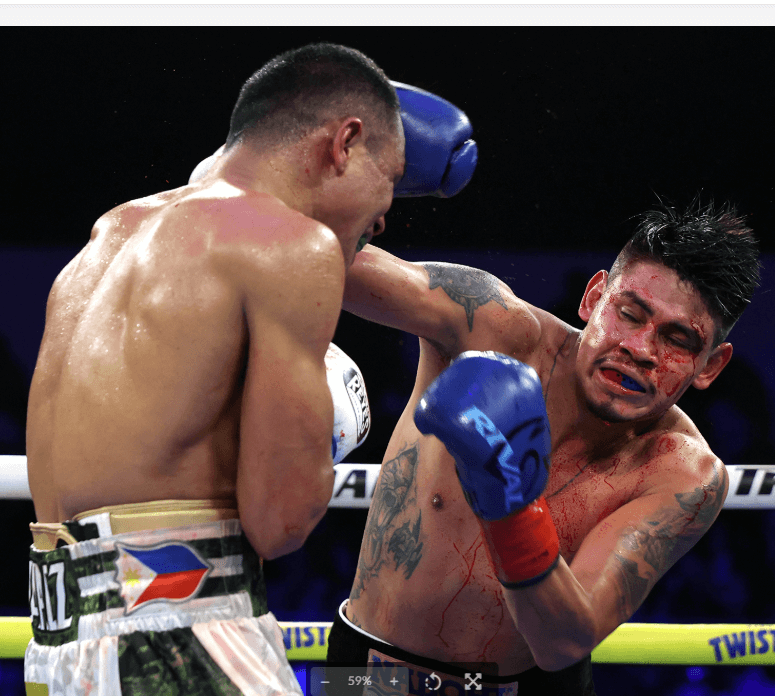
In a torrid battle Mexico’s Emanuel “Vaquero” Navarrete and his staccato attack staved off the herky-jerky non-stop assaults of Philippine’s Charly Suarez to win by technical decision and retain the WBO super feather world title on Saturday.
What do they feed these guys?
Navarrete (40-2-1, 32 KOs) and his elongated arms managed to connect enough to compensate against the surprising Suarez (18-1, 10 KOs) who wowed the crowd at Pechanga Arena in San Diego.
An accidental clash of heads opened a cut on the side of Navarrete’s left eye and forced a stoppage midway through the fight.
From the opening round Navarrete used his windmill style of attack with punches from different angles that caught Suarez multiple times early. It did not matter. Suarez fired back with impunity and was just as hungry to punch it out with the Mexican fighter.
It was savage.
Every time Navarrete connected solidly, he seemed to pause and check out the damage. Bad idea. Suarez would immediately counter with bombs of his own and surprise the champion with his resilience and tenacity.
Wherever they found Suarez they should look for more, because the Filipino fighter from Manila was ferocious and never out of his depth.
Around the sixth round the Mexican fighter seemed a little drained and puzzled at the tireless attacks coming from Suarez. During an exchange of blows a cut opened up on Navarrete and it was ruled an accidental clash of heads by the referee. Blood streamed down the side of Navarrete’s face and it was cleared by the ringside physician.
But at the opening of the eighth round, the fight was stopped and the ringside physician ruled the cut was too bad to continue. The California State Athletic Commission looked at tape of the round when the cut opened to decipher if it was an accidental butt or a punch that caused the cut. It was unclear so the referee’s call of accidental clash of heads stood as the final ruling.
Score cards from the judges saw Navarrete the winner by scores of 78-75, 77-76 twice. He retains the WBO title.
Interim IBF Lightweight Title
The sharp-shooting Raymond “Danger” Muratalla (23-0, 17 KOs) maneuvered past Russia’s Zaur Abdullaev (20-2, 12 KOs) by unanimous decision to win the interim IBF lightweight title after 12 rounds.
Both fighters were strategic in their approach with Muratalla switching from orthodox to southpaw at various times of the fight. Neither fighter was ever able to dominant any round.
Defense proved the difference between the two lightweights. Muratalla was able to slip more blows than Abdullaev and that proved the difference. The fighter from Fontana, California was able to pierce Abdullaev’s guard more often than not, especially with counter punches.
Abdullaev was never out of the fight. The Russian fighter was able to change tactics and counter the counters midway through the fight. It proved effective especially to the body. But it was not enough to offset Muratalla’s accuracy.
There were no knockdowns and after 12 rounds the judges scored it 118-110, 119-109 twice for Muratalla who now becomes the mandatory for the IBF lightweight title should Vasyl Lomachenko return to defend it.
Muratalla was brief.
“He was a tough fighter,” said Muratalla. “My defense is something I work on a lot.”
Perla Wins
Super flyweight Perla Bazaldua (2-0) eased past Mona Ward (0-2) with a polished display of fighting at length and inside.
Combination punching and defense allowed Bazaldua to punch in-between Ward’s attacks and force the St. Louis fighter to clinch repeatedly. But Ward hung in there despite taking a lot of blows. After four rounds the Los Angeles-based Bazaldua was scored the winner 40-36 on all three cards. Bazaldua signed a long term contract with Top Rank in March.
Photo credit: Mikey Williams / Top Rank
To comment on this story in the Fight Forum CLICK HERE
-
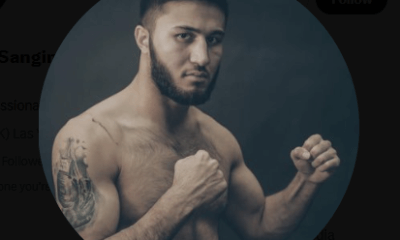
 Featured Articles4 weeks ago
Featured Articles4 weeks agoMekhrubon Sanginov, whose Heroism Nearly Proved Fatal, Returns on Saturday
-
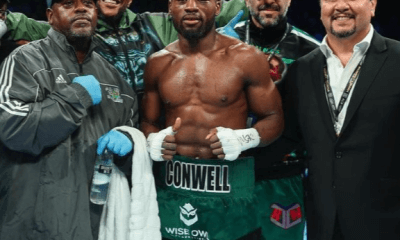
 Featured Articles4 weeks ago
Featured Articles4 weeks agoAvila Perspective, Chap. 322: Super Welterweight Week in SoCal
-
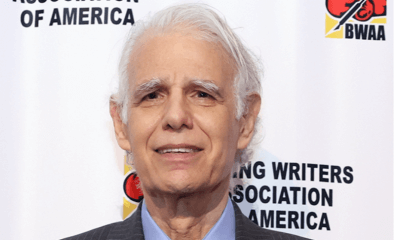
 Featured Articles4 weeks ago
Featured Articles4 weeks agoTSS Salutes Thomas Hauser and his Bernie Award Cohorts
-
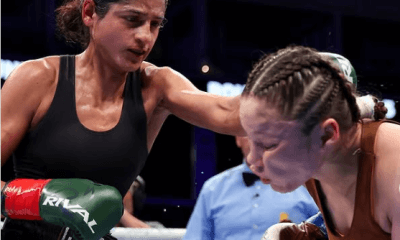
 Featured Articles3 weeks ago
Featured Articles3 weeks agoGabriela Fundora KOs Marilyn Badillo and Perez Upsets Conwell in Oceanside
-
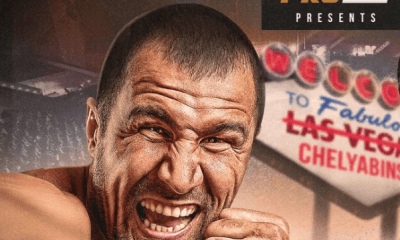
 Featured Articles3 weeks ago
Featured Articles3 weeks ago‘Krusher’ Kovalev Exits on a Winning Note: TKOs Artur Mann in his ‘Farewell Fight’
-

 Featured Articles3 weeks ago
Featured Articles3 weeks agoFloyd Mayweather has Another Phenom and his name is Curmel Moton
-
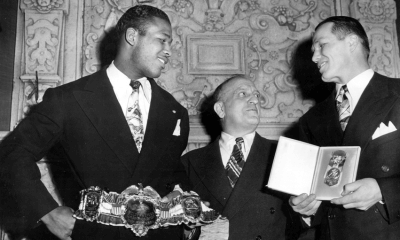
 Featured Articles3 weeks ago
Featured Articles3 weeks agoArne’s Almanac: The First Boxing Writers Assoc. of America Dinner Was Quite the Shindig
-
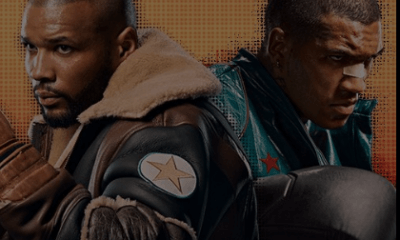
 Featured Articles3 weeks ago
Featured Articles3 weeks agoAvila Perspective, Chap. 323: Benn vs Eubank Family Feud and More















